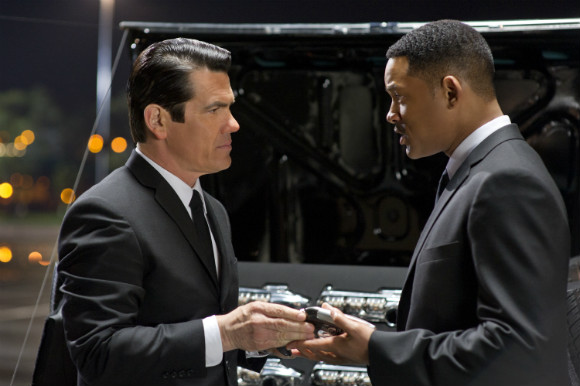Men In Black III

Josh Brolin (left) and Will Smith star in Columbia Pictures' MEN IN BLACK 3. PHOTO BY: Wilson Webb

There’s one moment in Men In Black 3 that transcends the mundane. A multi-dimensional being, Griffin (Michael Stuhlbarg), explains to Agent J (Will Smith) and Agent K (Tommy Lee Jones) his simultaneous perception of all possible trajectories of space-time. This could be an unwieldy sequence (think Midichlorians and Star Wars), but the writers delicately lay it down as a story of what might not have been if an outfielder of the New York Mets had grown up to be someone else. Mr. Stuhlbarg—as if a cross between a young, manic Robin Williams and a serene, icy-eyed Elijah Wood—steals the moment, and the show.
As relentless franchise machines go, Men In Black III manages to recover from what made its predecessor immediately forgettable. However, director Barry Sonnenfeld and writer David Koepp achieve this through recycling several tropes. These include: Sending a black man back in time as a set up for racial humor, intersecting principal characters with emotional historical moments, and tugging at the heartstrings with a denouement so statistically improbable the writers must have started there and written backward.
Granted, the film still manages to be entertaining in a few places and the heartstring-tugging isn’t exactly ineffective. However, an honest analysis must concede that these devices circumvent the necessity of a fundamentally good story that stands on its own merit. The story revolves around Boris the Animal (Jemaine Clement, fully leveraging his swarthy loathsomeness), an escaped intergalactic convict. Like every other villain in the series, his humanoid form seems to be merely an anthropomorphic shell which, I suppose, saves money on visual effects.
Boris seeks revenge for having his arm blown off by Agent K. Personally, I think it gives Boris much needed character. There’s a larger motive at work, however. But it only goes so far. It is, as you might expect a voice-over to say, up to Agents J and K to stop it.
The hitch? Though declared illegal, Boris manages to secure himself some time travel equipment. He goes back to July 17, 1969. It should be immediately obvious to history buffs why this is relevant. But why it was picked by the writers has probably less to do with the logic of needing a rocket (there were a number of them to pick from between the Mercury, Gemini and Apollo programs) than the desire to co-opt a specifically emotional event, Apollo 11, for lack of a more engaging story. It’s already been revealed in the marketing that Agent K is erased from history. The solution is, unfortunately, all too familiar for anyone who saw the previous two films.
Unfortunately, there isn’t much cleverness to it. It’s an action solution. Stop me when this sounds familiar: Some device will save the universe. There’s no explanation or process as to how it works. The two agents have to rough up some benign aliens for answers. Then they’ll fight some really bad aliens so they can recover a device which will save the Earth/universe. It’s not like watching an episode of, say, BBC’s Sherlock, in which the solution unfolds in some clever fashion… and, more importantly, is deduced through logical threads rather than a completely random explanation.
It’s amusing to see Josh Brolin as a young Agent K. We’ve seen this before, sure, but watch Mr. Brolin barely able to keep a straight face as he’s attempting to replicate Tommy Lee Jones’ deadpan delivery. Mr. Jones has very little screen time. He’s looking haggard, carted out for one more go-around. New to the series is Emma Thompson who replaces Zed (Rip Torn) as the MIB chief, codenamed O. Her role is something of a diversion, as we later are “rewarded” (or “punished” with yet another trope) with the real reason for K’s stoic silence.
The argument goes that a film should be graded relative to its peers. But does that mean we are to accept films that use franchises or tropes as crutches? It would be encouraging were audiences to aim higher for their ten, er- fifteen bucks (3D proves that studios have not yet learned how to give people a blue car when they ask for a blue car). However, if what you’re expecting to see is a cameo of Bill Hader playing Andy Warhol as an alien tired of making art of questionable value for people of questionable intelligence, then this is your movie.
 Men In Black III • Dolby® Digital surround sound in select theatres • Aspect Ratio: 1.85:1 • Running Time: 103 minutes • MPAA Rating: PG-13 for sci-fi action violence, and brief suggestive content. • Distributed by Columbia Pictures
Men In Black III • Dolby® Digital surround sound in select theatres • Aspect Ratio: 1.85:1 • Running Time: 103 minutes • MPAA Rating: PG-13 for sci-fi action violence, and brief suggestive content. • Distributed by Columbia Pictures
Dolby and the double-D symbol are registered trademarks of Dolby Laboratories.